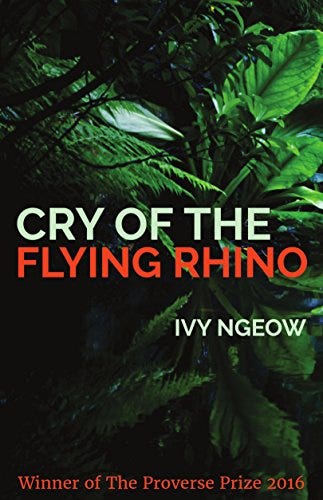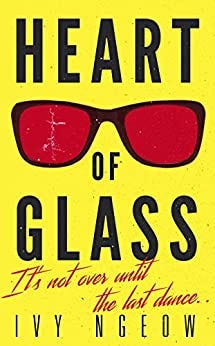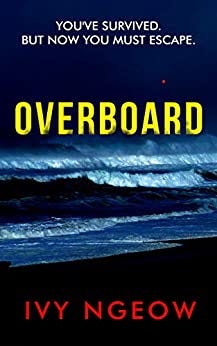Interview with Ivy Ngeow - 2021
Interview #3 (fiction, literary fiction, thriller, noir)
Ivy Ngeow is a multi award-winning author, born and raised in Johor Bahru, Malaysia. She has written three psychological suspense fiction novels and numerous short stories in international settings. An architect and musician, she's always had a flair for creative writing since childhood, winning her first national competition at 16. She turned serious after graduating from Middlesex University with an MA in Writing, as it was there that she won her first international competition, the 2005 Middlesex University Literary Press Prize out of almost 1500 entrants worldwide. In 2016, she was awarded the International Proverse Prize in Hong Kong for her debut, Cry of the Flying Rhino (2017). She is interested in culture, people and places, having lived in Malaysia, Singapore, Sydney where she trained in architecture, and London where she now lives.
Randal Eldon Greene: Hello, Ivy Ngeow.
I just finished reading your novel Cry of the Flying Rhino. If I'm not mistaken, this is your first book. Tell us a little bit about it.
Ivy Ngeow: Hi Randal,
Thanks for reading COTFR. It was my first book. I wrote it in 2005 when I was doing an MA program in Writing at Middlesex University. I have always been interested in the stark contrast between jungles and civilisation. I decided to set it in both as they both exist in Malaysia. I was born and raised in Johor. As such I am familiar with the setting because Johor is mostly plantations. Rubber, coffee, and pineapple. I am interested in the literary neo-noir thriller subgenre. I am also interested in Cubist novels where the reader puts together all the narratives so that the arcs intersect in a layered manner. My latest, Overboard, is also multiple viewpoint psychological literary fiction.
COTFR gave me a chance to focus on the big themes of the environment, nature, plantation injustice and inequality to the indigenous people in which I used multiple viewpoint narrative and the made up prison patois and jungle language to explore. These are not easy themes, let alone sixteen years ago. My novel took twelve years of submitting (my joke was that it was twelve years a slave), 70-80 rejections before one last go to a competition in Hong Kong. Many times I deleted the file from my hard drive only to rescue it again. Finally it won a literary award and cash prize in 2016. It was published in 2017, and I flew to Hong Kong to receive the prize.
Randal Eldon Greene: Cry of the Flying Rhino’s three POV characters feels like the setup for a joke: A doctor, a convict, and a pastor walk into a bar . . . Except it turns out to be no joke, or if there's some intended jest here, it's a dark and violent one. Where did you come up with these three very different men?
Ivy Ngeow: Yours is an excellent observation. No reader has ever become aware of my secret coding into those three guys. I didn't want to labour the point as it is fairly interpretive after all.
The three characters who walk into a bar are symbolic of what is inherent in all of us, our "human condition" to use the dreaded cliché. The doctor represents curiosity, progress and problem solving, something we all want to be good at. The convict represents nature, desire, and our instincts, which we suppress so well because these qualities have connotations of stupidity, led by no logical thought. The pastor represents the staunch blind positivity and belief in the spiritual, in good vs evil, that something is there to guide us and propel us no matter what, even in the darkest days and nights, even in the alien and hostile natural environment we cannot tame.
Randal Eldon Greene: And what does Talisa represent – the point around which all three men pivot to greater and lesser degrees?
Ivy Ngeow: I would say that the femme fatale trope is the wild card. Petulant as a spoilt child, yet streetwise, she is a paradox because we feel we know this character yet we don’t. Her secrets, in the form of tattoos, are public yet unknown and misunderstood.
Randal Eldon Greene: All of the main characters have their own arcs that send them (as most all good fiction does in some way) downward. I found Bernard – the pastor – to have the most fascinating downward spiral. His fall is one of moral corruption. He is a missionary in a place with myriad gods and spirits, and his job is to bring Jesus to these (in his mind) uncivilized people. And he is more or less successful, but just because he's bringing Jesus doesn't mean the locals are willing to give up their gods and traditions. And he is okay with this, or if not okay, then at least very lenient. At first we see him allowing belief in spirits of an animistic nature. Then we observe him making excuses for why he didn't protest against a dead woman having a pagan funeral with Christian rights.
These early spiritual corruptions are certainly commendable to me and in some ways help him to be forgiving and accepting of Minos, the convict. Yet at the same time, that utilitarian, moral corruption is what lets him eventually betray Minos and leads him into further acceptance of things that are, if not clearly wrong, then morally ambiguous, especially considering how he ends up profiting by it.
Does this behavior in Bernard reflect a reality of Christian ministry in Malaysia and the jungles?
Ivy Ngeow: Interesting viewpoint and character analysis. I don't know if his behaviour is representative of Christian ministry. He is just an individual, a modernist, who has to do what seems right TO HIM at certain points in time. There are many daily pressures on him, for example, funding, and fitting religion in a humane way with animistic systems, without destroying their cultures. He wants his church to be successful at conversion, to receive funding, which in turns brings more believers and then more funding. His motivations are egotistical yet godly, which is true of religious leaders. Remember that a lot of civilisations, e.g., Africa, the Indies, Australia, etc., were de-cultured due to the introduction of the new religion and language. He doesn't really subscribe to the old way or believe that the new governing forces should wipe out traditional beliefs.
Randal Eldon Greene: A modernist. What a great way to describe Bernard. But egotistical is certainly an apt description as well. All three narrators are a bit blind to themselves. Egotistical Bernard praises himself for securing the longhouse. Minos points out to us readers that the village leaders actually want him there because his ministry will bring in many resources, such as vaccines and school books for the children. Bernard, in turn, criticizes the tattoo Minos is so proud of; even this white foreigner can tell it's not authentic, not Iban-made. "What on earth was he thinking? A Shaman had not done this. It was a machine job from Chinatown." Benjie comes across as blind to his own potential happiness. He's so caught up in his situation that he fails to see where he could find easement or egress.
Ivy Ngeow: Yes all are blinded except Talisa and the reader, hence the multiple viewpoints. They all have their own opinion and ways of doing things. But somehow she is the narrative arc that does not exist yet ties the reader and the guys together in a web.
Randal Eldon Greene: Talisa was surprising. Did she surprise you too? I ask because the narrative is tightly plotted. Nevertheless, I felt continually surprised by the relatively silent Talisa. Was she entirely what you had expected her to be or did she grow in unexpected ways as you wrote your book?
Ivy Ngeow: I did not find her surprising because she has no point of view. Thank you for that observation. My plotting has always been in that layered non-linear style, a Chinese puzzle, full of twists, and has been described as Cubist. I have been influenced by the experimental stories of Bruno Schulz, the Christopher Nolan movie Memento or Tarantino’s Pulp Fiction where it's told through a mirror or the ending is actually the beginning, everything is in reverse etc. etc. All my novels have that "activity" element: the reader assembles the parts.
The surprising character was Bernard. At first he was just a bland conduit for connecting the worlds (the uncivilised and civilised), then suddenly he took turns. I absolutely fell in love with him! I had to listen hard and change the plotting slightly to suit the twists.
Randal Eldon Greene: I do understand what you mean about the less surprising nature of characters who are less narratively close. Nonetheless, Talisa does have surprises for the reader. And I, too, fell in love with the character of Bernard. I have to say, he is simply a fantastic inhabitant of this world you created. Do you often fall in love with the characters you create?
Ivy Ngeow: Yes! A writer has to, must, fall in love and begin to form a deep and intense understanding of at least one of the characters, good or bad, male or female. In Overboard, it is the Polish plumber, an intelligent immigrant in London. In COTFR it is Bernard, in Heart of Glass it's Li-an Donohue, the Chinese girl in Chicago.
It's really nice to be able to, so as to make them unpredictable so that 1/ they ring true, just like the charismatic people we know in real life are those who are unforgettable. 2/ It is also essential to make a character last well past the final page; remember Atticus of To Kill A Mockingbird, Lennie of Of Mice and Men, Tom Ripley of The Talented Mr. Ripley. These guys go beyond the page. When you love them, you accept and recognise their flaws. They become 3D entities, with all the good and bad characteristics, which make them NOT cardboard cutouts. 3/ The reader is very smart. The reader can sense all this. Everybody is both mean and kind, we all have good and bad points. Nobody's perfect. So if a writer bullshits and makes a character unrealistic and flat, meaning too good or too bad, they become boring. The reader will lose interest very quickly and be unable to "care" for the character. To make a reader care about your writing or your characters and want to be IN the story, and IN a room with the character, the character has to be someone the reader will empathise with: full of problems, conflicts, bad and good. Nobody wants to read about perfect people. As readers we have all been there before.
Randal Eldon Greene: And as a writer, I've written some flat characters and then rewritten them.
I want to ask you about Overboard, your latest novel. I confess, I own it but haven't read it just yet. Though it seems like it might be a thrilling exploration of time, memory, and identity. Of course, I'm only going off the back-of-the-book blurb.
Ivy Ngeow: No problem. Overboard is also a multiple viewpoint layered narrative. It examines ideas of: Is identity actually our own memory of who we are? Or is it made up? Do we choose who we want to be. Is it identity or memory when we think of what we had for breakfast as a child?
It was a blast to write Overboard. It took two months (autumn 2019). But almost a year of editing due to the multiple viewpoint puzzle. It was like a piece of furniture that came flat-packed but with no instructions; after it's made 3D, it has to be taken apart again and made better and sturdier than before with no visible fixings. I was one of those kids who took apart toys, pens, machines, lipsticks etc. Sometimes they went back together, sometimes I ruined them, upsetting myself and others tremendously. That is the wonder of childhood. As adults we don't take apart things unless they are broken and need fixing. LOL. And that's "adulting".
Therefore, writing has always appealed to my technical mind. It takes me back to a childhood curiosity. The emotional impact of writing and characterisation has come about from construction and deconstruction.
Randal Eldon Greene:
I remember taking apart an alarm clock as a child. And it never quite went back together again. Luckily, we writers have drafts and endless ability to pull apart and perfect our stories.
Speaking of identity, do you think we writers choose to be writers? Of course, writing hasn't always existed, so let me rephrase: Is being a storyteller innate in us writers or do you think it's more of a reaction to the world around us?
Ivy Ngeow: Alarm clocks are very good things to take apart. First the battery compartment. Then you just keep going. LOL.
I think no one would choose writing. It is a famously competitive, low or no-pay job which has to stay a side hustle if you do not make a living and become a success. Writing chooses you. I consider it a kind of love, or madness. Once you get the bitten or aware that you have been bitten, your mind will be always longing and yearning because the urge is to write, or be even unhappier than you already are, so you might as well.
On the writing itself, Haruki Murakami famously said: “There's no story if the protagonist is happy.”
On the writer: “Happiness is white ink on white paper.” - Henry de Montherlant
Randal Eldon Greene: Your books straddle the fence between literary and thriller. That's not always an easy place to find balance. What advice do you have for authors who want to create so-called high art, but who also want to explore the dirty, grimy, and thrilling world of crime and noir?
Ivy Ngeow: All the great works of literature have that overpowering theme of literary with crime. When in doubt, check on 20th century American lit and 19th century European lit. They are already a perfect blend of crime cliché and "the human condition".
To Kill a Mockingbird, Lolita, Thérèse Raquin, Crime and Punishment, For Whom the Bell Tolls, and of course, Of Mice and Men. All have great characters who do bad things over and over.
My advice is – has always been and will be – to follow the story. If it is a strong story, then it's a strong story. Your heart, your instincts, and your mind and fingers will follow.
Randal Eldon Greene: Wonderful advice! I can't see an argument against it.
I just read the interview you conducted with Lynne of Bletherin Books. I'd like to pose a similar question to the one you asked her. What I'd like to know is what constitutes an Ideal Reader for you?
Ivy Ngeow: It took me many years to find out who reads me, who likes what I like, as it's a Catch 22. You don't know until you write a few books, and you can't write a few books until you know.
I am still working on who this person is. I once thought it was my friend, a lawyer, but it isn't her as she likes light chick lit, women's romcom which is entertaining and relieves the dullness and seriousness of her profession after a long dull and serious day. She doesn't like crime fiction – it's too much like work. I made the mistake of thinking that I write crime, so a lawyer must like this. Don't make the mistake that I did, dear fellow writer. Now I know it's not the profession that makes the reader. It's the temperament.
The Ideal Reader can change, will change, and has changed for me since I started putting more books out. My Ideal Reader is someone I write for, so it's an intelligent (mature, could be young but mature) cultured, humorous and friendly person who may not be well-travelled but loves visuals, art, lifestyle, interesting characters and international locations. That might sound like a lot of topics, interests or subject matters, but it's actually just one: ideas.
Randal Eldon Greene: Your Ideal Read is one who likes ideas. Is one who prefers to think rather than just escape. My dear mother on occasion has accused me of taking all the fun out of reading because I like to analyze what I read—I like to really, really think about it. Eventually, I believe I was able to articulate to her my own perspective, which is that the ability to think deeply about literature gives one like myself another level of enjoyment beyond the surface enjoyment of entertainment. I think a lot of the readers Hello, Author is likely to attract will fit this definition. That's definitely a good thing.
I'll leave you with one final question. And that is, what are you working on now?
Ivy Ngeow: I love that I joined your group on Literary Fiction because it is so much more than the irritating lay description that it's "character-focused books without plot." It's so wrong as ideas ARE characters and plot. All the books rich in storytelling are both.
The Q and A has worked well, and I am sad that the journey has come to an end. "No. It has just begun." - goes the cliché, LOL.
I am working on a sequel to Overboard, set in Key West, FL. Right now I am only 27% into first draft. I am raising themes of "boundaries" and "atonement". It's about a single mum, Phoebe, who couldn’t wait to escape a London November (cold, dark, wet etc.) for sunny Florida when she’s invited by her new American boyfriend to his beautiful “vacay home” in Key West. The trouble is she arrives first. Robbed of her money, cards, her and her child’s passport on her first night, she has no choice but to wait for her boyfriend to show up. He doesn’t.
Thank you Randal for such a thought-provoking and moving set of questions. This is the MOST exciting Q&A ever. You should be on TV.
Randal Eldon Greene: Thanks, Ivy! It's wanting to have more conversations like ours that played a key role in me starting Hello, Author. I love talking books, and so maybe unsurprisingly, I am finding discussing books with their authors to be a sort of stimulating exchange of letters. I appreciate you letting me know how much you've enjoyed this exchange.
Find all of Ivy’s Books on Amazon:
Cry of the Flying Rhino
Overboard
© 2021
About the interviewer:
Randal Eldon Greene is the author of Descriptions of Heaven, a novella about a linguist, a lake monster, and the looming shadow of death. His typos are tweeted @AuthorGreene and his website is AuthorGreene.com






Enjoyed your take on creating characters. The Murakami quote resonates with me.